Photographs: Amit Dave/Reuters Shine Jacob in Kolkata
After revolutionising the electoral system of the world's largest democracy, India's electronic voting machines are set to do the same abroad.
The country has got its first firm order to export these machines to Namibia, while it is in talks with others, including Egypt and Saarc nations.
The EVMs were designed by the Election Commission of India in collaboration with two public sector undertakings -- Bharat Electronics, Bengaluru, and Electronic Corporation of India, Hyderabad -- which manufacture and sell them.
. . .
Indian EVMs get mandate abroad
Image: A polling officer arranges EVMs at an election control office in Kolkata.Photographs: Parth Sanyal/Reuters
"We have plans to sell customised EVMs to the election commissions of foreign nations. Right now, we have got a firm order from Namibia to export 1,700 machines worth $1.05 million.
"Talks are also going on with countries including Sri Lanka, Mauritius, Philippines, New Guinea, Malaysia and Nepal," said a top official from BEL.
However, he said there was no plan to share the technology with them.
During his recent visit to Egypt, India's Chief Election Commissioner S Y Quraishi had promised to lend EVMs to that country's electoral system in the post-Mubarak era.
. . .
Indian EVMs get mandate abroad
Image: An electronic voting machine.Also, there were reports that the country was in discussions with Pakistan for exporting them.
"Since 1989-90, BEL has produced and sold around 900,000 EVMs.
Investment made in the manufacturing facility amounts to Rs 28.50 crore (Rs 285 million).
"The total turnover from this project is around Rs 870 crore (Rs 8.7 billion)," said H V Keshava Murthy, additional general manager of Corporate Communication, BEL.
. . .
Indian EVMs get mandate abroad
Image: The circuit inside an EVM.Ashok Kumar, an official who is in charge of EVMs in ECIL, said his company too had manufactured the same number of EVMs.
Asked whether there was any plan to upgrade the machines, Murthy said, "EVM is a product specifically designed to suit the qualitative requirements of the customer, ECI. Upgrade work is undertaken up by BEL based on ECI instructions.
The latest upgrade was introduced in 2006-07."
. . .
Indian EVMs get mandate abroad
Image: An electronic voting machine.EVMs manufactured in 1989-90 were used on experimental basis for the first time in 16 Assembly constituencies in the states of Madhya Pradesh and Rajasthan and National Capital Territory of Delhi in November 1998.
Direct-recording EVMs are used in India and Brazil. Such machines collect and tabulate votes in a single machine.
Countries like Venezuela and the United States use them partially, while they were decommissioned by Netherlands following public concerns.
. . .
Indian EVMs get mandate abroad
Image: An electronic voting machine.Though in majority of the countries ballot papers are still used, some like the United Kingdom, Estonia, Canada and Switzerland use advanced technologies like Internet voting systems.
In India, there have been allegations regarding the authenticity of the machines.
Hari Prasad, a leading electronic security expert from Hyderabad, along with a computer scientist at the University of Michigan and a Dutch technology activist, had presented a paper in April 2010 alleging EVMs could be tampered with.
Prasad was later arrested in connection with the theft of an EVM.

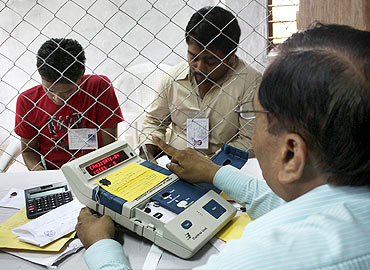
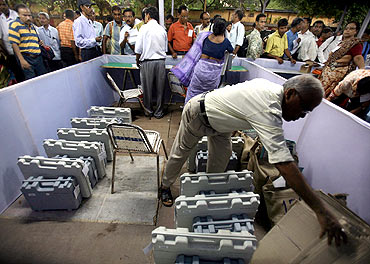
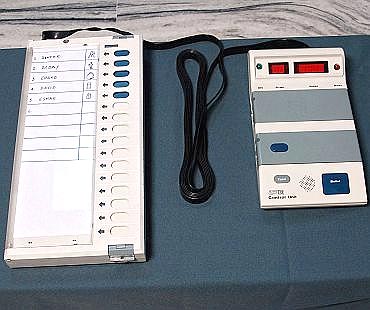
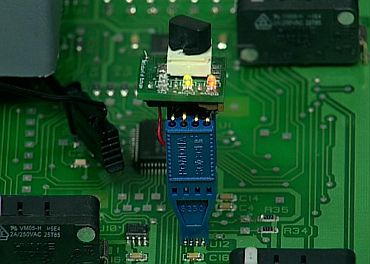
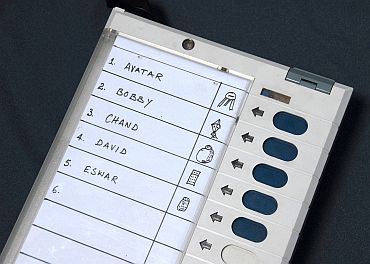
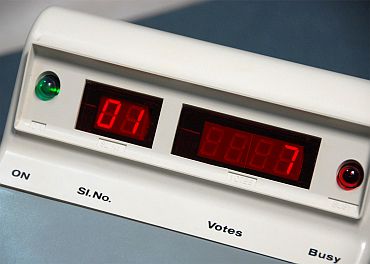

article